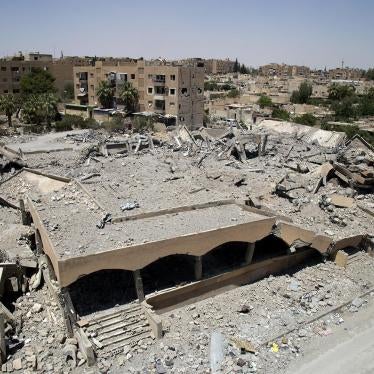Hundreds of people were shopping or selling fresh produce and livestock at the weekly market in al-Amar village in Yemen one Monday in late April when the sky suddenly filled with more than three dozen small parachutes. Over the next two hours residents heard more than a dozen small explosions and more the next day.
When residents went to the area where they heard the explosions come from, they found two unfamiliar canisters with round items attached. They turned out to be cluster munitions produced by Textron Corporation and supplied by the United States to Saudi Arabia and the United Arab Emirates. Both are part of a Saudi-led coalition that has been attacking Houthi forces, also known as Ansar Allah, in Yemen since the end of March.
The U.S. is not a party to the international Convention on Cluster Munitions. But its reluctance to press Saudi Arabia on cluster munition use in Yemen appears to be having an impact on three close allies who are parties to that treaty. Australia, the UK and Canada want to water down language in draft documents to be issued by the First Five-Year Review Conference of the treaty, which opens September 7 in Dubrovnik, Croatia. This issue is fueling a fight that may overshadow the conference.
The cluster munitions landed on the main road leading south from the village to Sanaa, the capital. When Human Rights Watch researchers visited the site a couple of weeks later they discovered yet another canister lying by a bush on the side of the road and villagers presented them with an unexploded submunition they found after the attack.
These were BLU-108 "skeets" from CBU-105 Sensor Fuzed Weapons, which are prohibited by the Convention on Cluster Munitions as they fall under the convention's definition of a cluster munition. The U.S. government states that this is the only cluster munition in its active inventory "that meet[s] our stringent requirements for unexploded ordnance rates," with a claimed failure rate of less than 1 percent. These cluster munitions may only be exported if the recipient agrees not to use them in civilian areas.
But Human Rights Watch found evidence that these weapons fell within 600 meters of villages in one attack in Yemen. It also found that some of the cluster munitions malfunctioned calling into question the required failure rate of 1 percent or less as their submunitions failed to disperse from the canister, or dispersed, but did not explode. The findings raise serious questions about whether the US export law requirements are being violated.
However, these are not the only U.S.-made cluster munitions being used in Yemen. The Saudi-led coalition has used another type of cluster bomb as well as cluster munition rockets, each delivering hundreds of submunitions prone to high failure rates.
The cluster munition attacks in Yemen have received strong media coverage, public outcry, and have been condemned by more than a dozen countries. However, the U.S. is not among those expressing concern. Since May, all that State Department officials have been willing to say publicly is that the US is aware of "reports" of the "alleged" use of cluster munitions by the Saudi-led coalition. In an August 19 article, however, an unnamed Pentagon official let slip that "the U.S. is aware that Saudi Arabia has used cluster munitions in Yemen."
Meanwhile, the United Kingdom, Australia, and Canada, which had not hesitated to condemn the Assad government's cluster munition attacks in Syria or use of the weapons in other countries in recent years, have become noticeably quiet when it comes to condemning civilian casualties from cluster munitions, especially in Yemen. These three countries are also pushing hard for other countries to dial back their outrage at the high-level Dubrovnik conference by expressing concern at "allegations" of cluster munition use rather than deploring or condemning the attacks.
During the 2007-2008 "Oslo Process" to negotiate the convention these three US allies were widely viewed as the ringleaders of an effort to include a provision in the draft treaty that would facilitate and regulate joint operations with states, like the U.S., who are not party to the convention. After signing the convention, the UK and then Australia and Canada enacted the weakest implementing laws of any members of the Convention on Cluster Munitions, laws that could be misused to allow their forces to assist the US or other non-parties to use cluster munitions or engage in other activities prohibited by the convention.
Stopping the tide of civilian suffering from cluster munitions matters more than words, which is why it is disappointing to see the convention's members spending so much diplomatic effort on what should be an uncontroversial call that has been made many times before.
The Convention on Cluster Munitions provides the best framework for the eradication of these weapons, but its stigma against them is only as strong as the commitment of its members. Australia, Canada, and the UK would do well to set aside their nitpicking and rally in support of the convention by condemning any use of cluster munitions against any actor under any circumstances.









